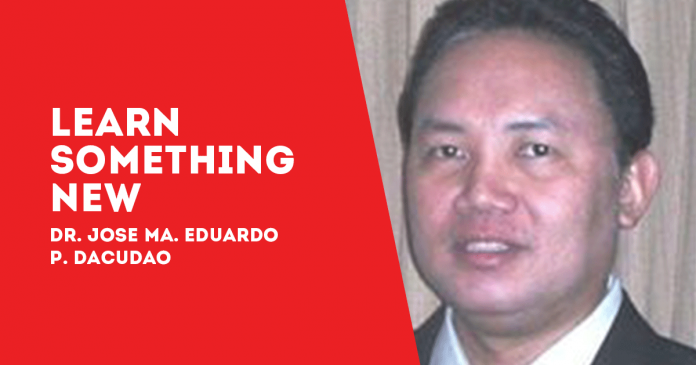
DR. BY JOSE PALU-AY DACUDAO
NOW consider the slogan itself: “The Month of the National Language is the Month of the Languages of the Philippines.”
The statement itself is self-contradictory! How can one National Language be many languages?
Perhaps, the slogan makers believe in that old patently false myth that one could create a “National Language” from all the Philippine languages? That is plain absurd. Any linguist adhering to international standards would tell you that this is impossible.
Given the differences in grammar, syntax, semantics, accent among the Philippine languages, one could not possibly amalgate them into some impossible chimera that retains all these languages’ unique characteristics.
Just to take a simple case, Cebuano Visayan is ASPECT-oriented in its conjugation grammatical rules. Tagalog is TENSE-oriented. If we create a “National Language” based on the tense-oriented conjugation rules of Tagalog, what happens to Cebuano then? Consign it to burial forever?
What has the National Language Policy done for the non-Tagalog Peoples of the Philippines?
From National Statistics Office surveys, the non-Tagalog peoples of the Philippines are dying. The National Language is nothing more than a fancy term for ethnic cleansing. Individuals are not literally killed, but the end result is still the death of their ethnic identities as their languages die out.
I could go on and on. In order not to waste more time, I shall go to some recommendations (which are actually excerpts from a paper presented in the NCAA-sponsored Cebu Language Seminar on Oct. 27-28, 2005):
1. Teach our languages in schools in their traditional areas, especially for history and literature, and many of the arts and humanities, while retaining English for the Sciences.
This is the only sure way to save a language. Empirical evidences from Iceland (Icelandic), Ireland (Irish), Wales (Welsh), Hawaii (the Hawaiian languages), mainland America (native American languages), Switzerland (Romance), and so on have repeatedly shown that minority languages can be consistently saved in this way.
2. Create a dictionary, syllabus, and eventually literature for all the Philippine languages.
This is necessary if we are to teach our languages in schools. For the larger Philippine ethno-linguistic peoples and some of the smaller ones, this is no problem because foreign religious missionaries from various Christian denominations and foreign linguists have often taken the time and effort to create such dictionaries and syllabuses, and to save these languages it is a matter of mass producing such syllabuses and introducing them into school curricula.
(It is such irony that non-Filipino foreigners have done more for our languages than so-called nationalistic Filipinos, and incredibly the national government has not funded the creation of even a single non-Tagalog dictionary or syllabus.)
Create a Commission on Saving Philippine Languages and Ethnolinguistic Peoples that is funded by the national government (or federally funded if the Philippines becomes Federal) whose aims are the above, whose physical infrastructure is rotated among the present-day non-Tagalog Philippine provinces. This Commission can also accept funding from local governments and institutions, educational institutions, and private institutions.
3. Scrap the present-day Commission on National Language.
It’s P50 million or so budget a year comes from the combined taxes of all Filipinos, including non-Tagalogs, yet not only has it not done anything for the non-Tagalog Peoples of the Philippines, its actions are even now contributing to their demise.
Perhaps, it should be changed into the Commission on Saving Philippine Languages and Ethnolinguistic Peoples mentioned above, and its aims reoriented.
If taxes are to be used to promote Tagalog, then those taxes should come from the Tagalog people. Why should a non-Tagalog people pay taxes to support an institution that works to kill its language?
We should explicitly teach the recognition, respect, and preservation of the non-Tagalog Philippine languages and ethno-linguistic peoples in Philippine schools.
1. Immediately stop the despicable habit of Filipino teachers of fining students for speaking in a non-Tagalog Philippine language in all Philippine schools, and expel teachers who insist on continuing this and other similar discriminatory practices.
To teach a child to feel shame at his language and ethno-linguistic identity at a tender age when he still cannot see its wrongness is the same as brainwashing and imprinting in him an unnatural and servile lifetime attitude, which in the larger perspective only serves to install a shameful inferiority complex among the non-Tagalogs Filipinos and encourages arrogance and a sense of superiority among Tagalogs.
2. Use regional languages for the present Makabayan subjects, or just scrap this program if its real aim and effects are to transform all Filipinos into Tagalogs.
In general, any subject whose real aim and effects are to transform non-Tagalog Filipinos into Tagalogs should be scrapped.
3. Incorporate in the social sciences, history and arts subjects that explicit teach that non-Tagalog Filipinos should be of sociologically equal status with Tagalogs, and are in fact as Filipino as the Tagalog people. (To be continued)/PN



